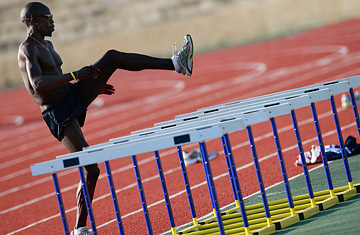
Lopez Lomong carried the American flag at the Olympic opening ceremony.
In 2000, Lopez Lomong was living in a Kenyan refugee camp, one of the Lost Boys of the Sudan who had seen unimaginable horrors for most of his young life. He had just earned 5 shillings for washing someone's cow, and his friends wanted to walk five miles to the only black-and-white TV in town to watch something called the Olympics. Lomong had never heard of such a thing. When his crew finally arrived, he had to pay to see the tube. Price: 5 shillings.
You can thank that odd job in Africa for producing the 23-year-old U.S. flag-bearer at this Olympics opening ceremonies in Beijing. That night in Kenya, Lomong watched runner Michael Johnson win gold in the Sydney, and he was hooked. "It was so great to see somebody cheering for somebody running," says Lomong. "Running is something we did all our lives. It was our transportation." He told himself then that he'd be an Olympian. Now, just eight years later and a new U.S. citizen, he has not only carried the American flag in front of millions of television viewers around the world, he'll be running the 1,500-m for the United States.
Which also means that for one night, he became the most visible, and influential, Sudanese man in the world. And in the run-up to these Olympics, China has faced fierce criticism for its support of the Sudanese government, which has sponsored atrocities in the Darfur region. Before war tore the Sudan apart, Lomong says he loved his native country. "I was the happiest kid in the Sudan," says Lomong. Will he take the moment to stand up for those Lost Boys left behind, the ones still coping with war, starvation, and death back home in Africa? Will he call on China to cut ties to the oppressive government responsible for so much destruction? On Friday morning, he was repeatedly asked by the international press to join the critics of China's human rights record, its ties to the Sudan, and its decision to revoke the American Darfur activist and former Olympian Joey Cheek's visa. Each time, Lomong dodged. "I'm here to inspire other kids who are out there watching these Olympics," he said at one point.
Lomong's neutral stance may disappoint some, but given what Lomong has gone through, you can't blame him for just cherishing this moment for what it is — a reward for a very brave man. You can't blame him for staying positive; he's lived through enough negatives in his life. When he was just six, a Sudanese rebel group kidnapped him and 50 others while he was in a church service. "We were praising God," he says. "All of a sudden, soldiers came in and told everyone to lay down." He escaped prison, and ran for three days and three nights, to the Kenyan border. He lived in a refugee camp for ten years. "I witnessed a lot of kids go to sleep, and never stand up again," he says. "It was one of those things — 'Well, it's his day today. Tomorrow could be my day.'"
In 2001, while living at a camp in Kenya, he learned about a U.N. program to resettle 3500 Lost Boys into the United States. He penned an essay about his experience — "I was writing in Swahili, and English, and Swahili, and English," he recalls — and was picked. On July 31st, 2001, he moved in with a family in upstate New York. During his early days living in the U.S., Lomong wouldn't throw away a leftover McDonald's chicken sandwich, not believing that you could actually get more the next day. He learned the basics, like how to operate a shower. "Cold water, hot water, how to put it in the middle," Lomong recalls.
Lomong went on to become a middle distance star at Northern Arizona University, and has now arrived as a first time Olympian. This is his moment. He's had a traumatic, remarkable story, and he deserves to spend it however he wants. If it's not about China, it's all about him. In Lomong's case, that quite all right.
